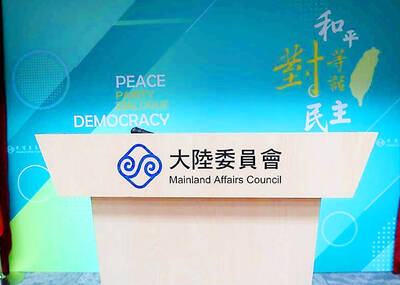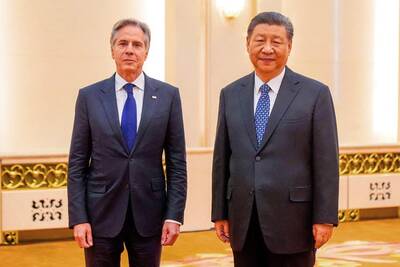The US Senate on Wednesday passed a bill promoting closer ties with Taiwan, which Beijing has warned could threaten stability in the Taiwan Strait, but drew praise from Taipei, which pledged to deepen cooperation.
The US Senate unanimously passed the Taiwan Travel Act. In January, the bill passed the US House of Representatives without opposition.
The legislation now only needs US President Donald Trump’s signature to become law.

Photo: Fang Pin-chao, Taipei Times
It should be US policy to allow US officials at all levels to travel to Taiwan to meet their Taiwanese counterparts, permit high-level Taiwanese officials to enter the US “under respectful conditions” and meet with US officials, and encourage Taiwanese economic and cultural representatives to conduct business in the US, the bill says.
White House officials did not immediately respond when asked if Trump planned to sign the legislation.
It would be unusual for a president to veto a measure that has passed unanimously.
The Ministry of Foreign Affairs thanked the US for its unanimous support for the bill, and its increasingly friendly and open attitude toward Taiwan.
“The ministry will continue to develop an even more substantive cooperative relationship with the US, to promote both sides’ joint values and mutually beneficial interests,” it said.
The Presidential Office said the US was its most important international ally, and that it would discuss the matter with the US and further strengthen relations.
President Tsai Ing-wen (蔡英文) took to Twitter to express her gratitude, saying that the bill symbolizes the US Congress’ long-standing support of Taiwan, and that the Taiwan-US partnership is a key pillar of peace and stability in the Indo-Pacific region.
However, lawmakers yesterday said that Taiwan should not be “overly optimistic” about Taiwan-US relations following the passing of the bill, with some suggesting that Trump signing the legislation could escalate tensions across the Taiwan Strait.
Democratic Progressive Party (DPP) Legislator Tsai Shih-ying (蔡適應), who serves on the Foreign Affairs and National Defense Committee, said the bill is important in eliminating barriers to visits by high-level officials, but it is not something that would happen overnight.
He compared the development of Taiwan-US relations to stacking blocks, saying it is a process that takes time, so Taiwan would need to be patient and not expect high-level US officials to visit as soon as the bill is signed.
DPP Legislator Lo Chih-cheng (羅致政) said that the bill would definitely elevate cooperation between Taiwan and the US, but it really depends on how Washington chooses to execute it.
Chinese Nationalist Party (KMT) Legislator Johnny Chiang (江啟臣), who is also on the foreign affairs committee, said the Chinese government is certain to respond.
In the long term, China could continue to limit Taiwan’s international participation to keep the US in check, he said.
The US has used arms sales to Taiwan and its support of Taiwan as leverage in its negotiations with China, Chiang said.
The act could serve as another card in the US’ negotiation strategy, depending on how Washington chooses to play it, he said.
Given that Trump’s signing of the bill could escalate tensions across the Taiwan Strait, whether it helps or hinders the nation remains to be seen, he said.
In Beijing, Chinese Ministry of Foreign Affairs spokeswoman Hua Chunying (華春瑩) said that while some of the new bill’s provisions are not legally binding, it “seriously violates” the “one China” principle.
“China is strongly dissatisfied and firmly opposes it,” Hua told a regular news briefing.

NO RECIPROCITY: Taipei has called for cross-strait group travel to resume fully, but Beijing is only allowing people from its Fujian Province to travel to Matsu, the MAC said The Mainland Affairs Council (MAC) yesterday criticized an announcement by the Chinese Ministry of Culture and Tourism that it would lift a travel ban to Taiwan only for residents of China’s Fujian Province, saying that the policy does not meet the principles of reciprocity and openness. Chinese Deputy Minister of Culture and Tourism Rao Quan (饒權) yesterday morning told a delegation of Chinese Nationalist Party (KMT) lawmakers in a meeting in Beijing that the ministry would first allow Fujian residents to visit Lienchiang County (Matsu), adding that they would be able to travel to Taiwan proper directly once express ferry

STUMPED: KMT and TPP lawmakers approved a resolution to suspend the rate hike, which the government said was unavoidable in view of rising global energy costs The Ministry of Economic Affairs yesterday said it has a mandate to raise electricity prices as planned after the legislature passed a non-binding resolution along partisan lines to freeze rates. Chinese Nationalist Party (KMT) lawmakers proposed the resolution to suspend the price hike, which passed by a 59-50 vote. The Taiwan People’s Party (TPP) voted with the KMT. Legislative Speaker Han Kuo-yu (韓國瑜) of the KMT said the resolution is a mandate for the “immediate suspension of electricity price hikes” and for the Executive Yuan to review its energy policy and propose supplementary measures. A government-organized electricity price evaluation board in March

MANAGING DIFFERENCES: In a meeting days after the US president signed a massive foreign aid bill, Antony Blinken raised concerns with the Chinese president about Taiwan US Secretary of State Antony Blinken yesterday met with Chinese President Xi Jinping (習近平) and senior Chinese officials, stressing the importance of “responsibly managing” the differences between the US and China as the two sides butt heads over a number of contentious bilateral, regional and global issues, including Taiwan and the South China Sea. Talks between the two sides have increased over the past few months, even as differences have grown. Blinken said he raised concerns with Xi about Taiwan and the South China Sea, along with China’s support for Russia and its invasion of Ukraine, as well as other issues

FAST RELEASE: The council lauded the developer for completing model testing in only four days and releasing a commercial version for use by academia and industry The National Science and Technology Council (NSTC) yesterday released the latest artificial intelligence (AI) language model in traditional Chinese embedded with Taiwanese cultural values. The council launched the Trustworthy AI Dialogue Engine (TAIDE) program in April last year to develop and train traditional Chinese-language models based on LLaMA, the open-source AI language model released by Meta. The program aims to tackle the information bias that is often present in international large-scale language models and take Taiwanese culture and values into consideration, it said. Llama 3-TAIDE-LX-8B-Chat-Alpha1, released yesterday, is the latest large language model in traditional Chinese. It was trained based on Meta’s Llama-3-8B